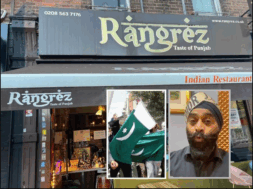
SC Halts Unauthorised Demolitions till October 1, Frowns on Glorification of “Bulldozer Justice”
Manas Dasgupta
NEW DELHI, Sept 17: The Supreme Court on Tuesday halted unauthorised demolition of private property anywhere in India till October 1, when it will next hear arguments against “bulldozer justice,” the practice by some state governments to destroy residential or commercial property owned by people accused in criminal cases and their immediate family members while drawing attention to reports of “glorification, grandstanding and even justifications” of such acts by different governments.
The court dismissed concerns by the government – represented by Solicitor General Tushar Mehta – that its order would impact legally sanctioned demolitions. “The heavens won’t fall if we ask you to hold your hands till (the) next hearing”, a bench of Justice BR Gavai and KV Viswanathan declared.
An irate top court – which has already come down hard, twice this month, on ‘bulldozer justice’ – also warned against “grandstanding” and “glorification” of this practice. “No demolition, till next, date, without permission of this court,” it said, warning the Election Commission may be put on notice.
The bench said the authorities had continued with the demolitions despite a Supreme Court order on September 2 that the law did not permit the destruction of homes and properties of accused awaiting trial, or even of convicts. The court had observed that the authorities would not be permitted to bulldoze the laws of the land. “There has been glorification, grandstanding and justification of bulldozers after September 2,” Justice Viswanathan addressed Solicitor General Tushar Mehta, appearing for the State of Uttar Pradesh.
The court also waved away Mr Mehta’s suggestion it had been influenced by a “narrative”, pointing out “even if there is one instance of illegal demolition, it is against the ethos of the Constitution.” “The ‘narrative’ is not influencing us. We made it clear that we won’t (stop) demolition of unauthorised construction… but the executive can’t be a ‘judge’ (of what is illegal),” the Supreme Court said, saying, once again, that it will also lay down guidelines to identify potentially illegal constructions.
Justice Gavai said the bulldozer culture had continued even after the apex court decided to frame guidelines against illegal demolitions by the authorities. It was time to “stay your axe,” Justice Gavai said. “There needs some oversight. After our orders, there have been statements that bulldozers will continue… That it depends on [in] whose hands the steering is…” Justice Gavai said.
The court said there would be no bulldozer demolitions without the leave of the Supreme Court till October 1, the next date of hearing. The court said the stay order would, however, not apply to unauthorised structures on public roads, streets, footpaths, or abutting railway lines, or on public places such as water bodies.
Justice Viswanathan asked Mr Mehta to assist the court on ways to stop illegal, retributory or communal demolitions by State or municipal authorities. The judge said the court could even arraign the Election Commission of India in the case.
Mr Mehta accused the petitioners, Jamiat Ulema-i-Hind, represented by senior advocate C.U. Singh, of giving the court a coloured narrative of the demolitions. He said the demolitions were grounded on statutory provisions and municipal laws based on notices issued to the owners of unauthorised buildings. “I will assist Your Lordships to be disabused of this narrative of the petitioners,” Mr Mehta reacted.
But Justice Viswanathan said Mr Mehta had himself disagreed with illegal demolitions in the September 2 hearing, that still they had continued with impunity, accompanied by statements of glorification and grandstanding. “Now, should this happen in our country? Where is the sanction for such demolitions? Whether the Election Commission should be issued notice? You will assist us… Unauthorised buildings, by all means after following procedure. But for any other extraneous reasons, under no circumstances whatsoever should it happen,” Justice Viswanathan emphasised.
Justice Gavai explained the court was not preventing the demolition of unauthorised structures, no matter what the faith of the owner of the building was. “If you want to demolish a gurdwara, temple or a masjid located on a public road, do it… If there are houses abutting railway lines, yes,” Justice Gavai observed.
Justice Viswanathan lashed out that the State should first disabuse its mind of the feeling that the court was against it. “We go by your affidavit. We want to streamline… There would be directives laid down within the framework of the municipal law, so that this whole concept [of bulldozer justice] is a bad dream,” Justice Viswanathan addressed Mr Mehta orally.
On September 2, the apex court had decided to frame uniform guidelines on a pan-India basis to streamline the procedure for identifying unauthorised structures, issuing notice to persons concerned, giving them a fair hearing and subsequent action.
“If we lay down guidelines, even digitalise the process, neither authorities nor the persons concerned can take advantage,” Justice Viswanathan had said. The petitioners had highlighted the recent cases of demolitions in Madhya Pradesh and Rajasthan.
In Madhya Pradesh, a family’s ancestral home was pulled down. In Udaipur, the municipal corporation demolished a tenant’s house for allegedly ‘encroaching’ on forest land. The razing of the house had followed shortly after the tenant’s 15-year-old son was arrested for allegedly stabbing his classmate from another community, leading to communal tensions in the city.
The last time the court heard the case in 2022, Mr Dave, appearing for Jamiat Ulama-i-Hind then, had said the court should view the problem from a larger perspective. He had said the country was a facing an “extraordinarily serious” situation. Justice was being delivered by the arms of the bulldozer. Rule of law lay in the debris.
Mr Dave had argued that powerful State governments and their functionaries were taking advantage of municipal laws to “wreak vengeance” by using bulldozers to demolish the private homes and buildings of people they believed were behind communal violence and riots.
In its detailed affidavit filed two years ago, the Uttar Pradesh government had said petitions filed in the Supreme Court against “routine” demolitions were a surreptitious attempt by third parties, including the Jamiat Ulama-i-Hind, to protect “illegal encroachments” and “sensationalise” the issue.
Uttar Pradesh had said demolitions conducted were those against unauthorised constructions on public land. Action was taken strictly under the U.P. Municipal Corporation Act, 1959 and the U.P. Urban Planning and Development Act, 1973.














